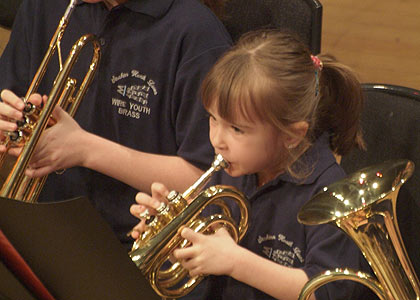2008 National Youth Band Championships - Postcard from Manchester
16-Apr-2008With so much to enjoy it may seem things don't need to change here at these championships - but they do...

Starting young!
Picture: John Stirzaker
The maxim of ‘..if it ain’t broke, don’t fix it’, was usually the mantra reserved for those whose idea of radical change was to complain to the BBC when they stopped playing the National Anthem at the end of a night’s broadcasting.
It remains the recipe of paralysis, and the argument that if adhered to could well lead the National Youth Band Championships to become a victim of its own success.
Just because you believe something works, doesn’t mean that it always works well, and with the constant need for organisations even as august as the BBC to evolve (or not, according to Noel Gallagher and the Glastonbury Festival), on-going change that anticipates possible future paralysing problems is essential. The British Federation of Brass Bands now finds itself very much in that situation with these championships.
Working hard
The BFBB has worked tremendously hard to ensure that the event has become a first class event and can quite rightly be proud of its efforts. It’s the future that is the worry though.
Thankfully, Robert Morgan MBE, Chairman of the BFBB and his hard working team recognise this and have openly stated that they are looking at ways to ensure the continued success of its flagship youth championships.
“We are looking at ways in which the championship can grow and continue to attract as many youth bands to compete in each of the sections. We recognise that circumstances change and we would like interested people to tell us what they think.”
Numbers
This year the competitions at the Royal Northern College of Music attracted 31 bands compared to 39 last year (29 in 2006 and 35 in 2005). The reasons for the fluctuation in numbers are varied – from the differing dates of the holidays in areas of the country to the cyclical nature of player development in terms of numbers and standards, and even the selection of test pieces.
These elements will always mean that entries rise and fall to mirror what is happening in youth bands, schools, music services and education authorities, but it is surely the current criteria used to place bands in appropriate sections here that is in greatest need of overhaul.
Criteria
For instance, the difference in criteria between the Premier Section and County Championship seems virtually non existent, and may well account for the reason why the former had just the one entrant whilst the latter had eight, including one that took part in the Premier event last year. A rather misplaced choice of premier test piece was surely not the only reason for that.
The same applies to the Junior and Community Sections too. The age differential is fairly meaningless when you get huge education authority/Music Service ensembles competing against small single youth bands organisations as happened in the Junior Championship this year.
Great work
The BFBB has done great work in trying to attract grass root bands to compete here, but how can you continue to encourage a small ensemble of 17 players (such as Shirland Youth this year) if they are to play against a rival that can boast over 50 members in its ranks?
Those massed bands should surely have entered the Schools Championship (or not as the case should surely be) that currently allows training/learner bands from education authorities/organisations to compete.
Very few of the bands here seem to fit into the right section as it were (with the possible exception of the Community Section, which not surprisingly had a 15 entrants).
Evolve
The people who 4BR has talked to who recognise the need for evolved change seem to fall into two distinct camps. First there are those who think that the championships should mirror what has been put in place at the National Festival of Music for Youth in London, whilst the others think that a greater emphasis on age levels (as in Scotland) should be the way forward.
Both arguments have considerable merit of course, but also offer potential future problems as well as solutions too, but it would be nice to report that those who are interested in the future well being of this great event do take the opportunity of talking to the BFBB – because they are willing to listen.
Awards
Whilst they are at it, they could also possibly look at the grading of performances into Gold, Silver and Bronze and explain coherently and precisely the criteria for their award.
Awarding Gold is great, but it becomes as worthless as a tray of necklaces at the Elizabeth Duke counter at your local Argos store, if there is no specific reasoning behind doshing them out. (It is also the type of thinking that led to Shirland Youth being given the most improved award in the Junior Section this year too)
There is so much to enjoy each year at this event that it would be a great pity that the National Youth Championships cannot continue to expand and develop in the years to come to reflect how youth banding itself is developing at all levels throughout the country.
The BFBB is willing to listen, so why not give them a call?
Iwan Fox















